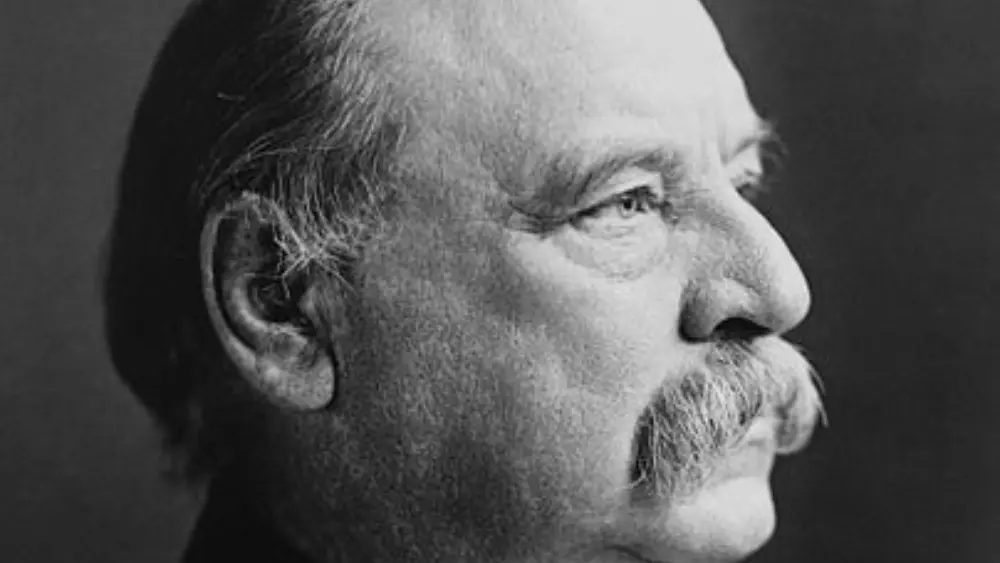Stephen Grover Cleveland, the 22nd and 24th President of the United States, holds the distinction of being the only president to serve two non-consecutive terms in office. Born on March 18, 1837, in Caldwell, New Jersey, Cleveland’s life and political career were characterized by his commitment to public service and his advocacy for reform.
Early Life and Education
Grover Cleveland, the future 22nd and 24th President of the United States, was born on March 18, 1837, in Caldwell, New Jersey. He had humble beginnings in his early life, as his family raised him in modest means. Despite the financial challenges, Cleveland demonstrated an early commitment to education, laying the groundwork for his future success. He attended the Fayetteville Academy in New York, where he received a solid academic foundation that would later serve as a stepping stone for his illustrious career in public service.
Following his time at the Fayetteville Academy, Cleveland embarked on a journey into the legal profession. In Buffalo, New York, he started studying law under the guidance of local lawyers, and he gained admission to the bar in 1859. Cleveland’s dedication to education and his commitment to the pursuit of knowledge played a pivotal role in shaping his character and values, which would later define his presidency and his lasting impact on American politics.
Grover Cleveland: Entry into Politics
Grover Cleveland’s foray into the world of politics commenced with his appointment as the sheriff of Erie County, New York, in 1871. His unwavering commitment to upholding the law and his reputation for unwavering honesty and integrity swiftly garnered the attention and respect of the local community. Cleveland’s dedication to enforcing the law fairly and justly earned him the endearing moniker “Grover the Good,” a title that underscored his reputation as a principled and virtuous public servant.
Cleveland’s tenure as sheriff began his rise in the political arena, laying the groundwork for his subsequent roles as mayor of Buffalo and governor of New York. His emphasis on transparency, accountability, and ethical governance during his early years in politics established a foundation of trust and respect that would follow him throughout his political career, ultimately propelling him to the highest office in the land as the 22nd and 24th President of the United States.
Reform-Minded Leadership
Grover Cleveland ascended to prominence within the Democratic Party, defining it with his unwavering commitment to reform and his resolute stance against corruption. Throughout his political career, he championed progressive policies to improve governmental accountability and transparency. Cleveland’s reform-minded leadership style resonated with the American public, as he consistently advocated for the interests of ordinary citizens over those of special interests and political machines.
During his presidency, Cleveland took a firm stance against political corruption, earning a reputation as a principled and ethical leader. His steadfast commitment to civil service reform, including efforts to reduce governmental patronage and promote merit-based appointments, solidified his legacy as a president dedicated to promoting the common good and ensuring the integrity of the nation’s political institutions. Cleveland’s reformist agenda set a precedent for future generations of leaders, emphasizing the vital importance of ethical governance and the pursuit of policies that prioritize the well-being of the American people.
Grover Cleveland: Governor of New York
Grover Cleveland’s term as the Governor of New York from 1883 to 1885 marked a pivotal period in his political career, further solidifying his reputation as a dedicated public servant focused on ensuring governmental accountability and efficiency. During his tenure as governor, Cleveland worked tirelessly to implement policies to curb corruption and promote transparency in state affairs. His unwavering commitment to responsible governance and his emphasis on fiscal discipline garnered widespread acclaim, earning him the trust and support of the people of New York.
Cleveland’s tenure as governor was characterized by his resolute efforts to challenge the entrenched interests and political machines that had long dominated the state’s political landscape. His dedication to enacting reforms that prioritized the public interest over special interests underscored his commitment to serving the needs of the people. Cleveland’s principled leadership during his governorship set the stage for his subsequent presidential bid and positioned him as a prominent figure in the national political arena, recognized for his integrity and his dedication to advancing the principles of good governance.
First Term as President
Grover Cleveland’s first term as President, spanning from 1885 to 1889, was defined by his steadfast dedication to enacting civil service reform and upholding principles of fiscal conservatism. With a government riddled with corruption and inefficiencies, Cleveland prioritized overhauling the civil service system, aiming to introduce a merit-based approach to appointments rather than the prevalent practice of political patronage. His unwavering commitment to reforming the government and promoting transparency earned him praise from reformers and citizens alike, solidifying his reputation as a president dedicated to the betterment of the nation.
Cleveland’s emphasis on fiscal responsibility during his first term was evident in his efforts to reduce government spending and advocate for a balanced budget. His staunch opposition to unnecessary government expenditures and advocacy for a responsible approach to fiscal management reflected his belief in maintaining the nation’s financial stability. Cleveland’s commitment to sound fiscal policies and ethical governance during his first term as President laid the groundwork for his enduring legacy as a leader dedicated to promoting the interests of the American people and ensuring the integrity of the nation’s governance.
Grover Cleveland: Challenges and Achievements
Grover Cleveland’s presidency was marked by a series of significant challenges, the most notable being the severe economic depression of 1893, which posed a formidable test to his leadership. Faced with widespread economic distress and unemployment, Cleveland took decisive action to stabilize the economy, implementing measures to restore confidence in the financial system and restore economic prosperity. His efforts to address the economic downturn underscored his commitment to preserving the nation’s financial stability and his determination to mitigate the adverse impacts of the depression on the American people.
Despite the challenges he confronted during his presidency, Grover Cleveland achieved several notable accomplishments that left a lasting impact on the nation. His unwavering commitment to civil service reform and his advocacy for fiscal conservatism laid the groundwork for a more transparent and efficient government. Cleveland’s dedication to promoting the common good and his prioritization of the interests of the American people over political patronage and special interests solidified his legacy as a principled and effective leader. His enduring contributions to governance and his efforts to uphold the integrity of the presidency remain a testament to his enduring impact on the trajectory of American history.
Loss and Second Term
After an arduous campaign, Grover Cleveland lost the 1888 presidential election to Benjamin Harrison, marking a temporary setback in his political career. However, his unwavering commitment to public service and his enduring popularity among Americans paved the way for his successful return to the White House in 1892. His election to a second term in 1892 made him the only president in American history to serve nonconsecutive terms, a testament to his resilience and continued appeal to the electorate.
During his second term, Cleveland faced the daunting challenge of navigating the country through the severe economic depression of 1893. Despite the turbulent economic climate, Cleveland remained steadfast in his efforts to stabilize the economy and restore public confidence. His presidency during this period was characterized by his steadfast commitment to promoting the interests of the American people and his determined pursuit of policies to address the nation’s most pressing challenges. Cleveland’s second term in office cemented his status as a dedicated and resilient leader whose enduring legacy continues to resonate in the annals of American political history.
Grover Cleveland: Legacy and Impact
Grover Cleveland defined his legacy as the 22nd and 24th President of the United States through his unwavering dedication to principles of honest governance and his commitment to promoting the welfare of the American people. Throughout his political career, Cleveland demonstrated an unyielding devotion to civil service reform and the ideals of transparency and accountability in government. His advocacy for fiscal responsibility and his efforts to curtail governmental corruption underscored his commitment to upholding the integrity of the nation’s political institutions.
Cleveland’s impact on American politics during a transformative era in the nation’s history remains enduring. His steadfast leadership in navigating the challenges of the economic depression of 1893 showcased his resilience and determination to prioritize the needs of the American people. By emphasizing the importance of ethical governance and responsible fiscal management, Cleveland left an indelible mark on the trajectory of American political history, setting a precedent for future leaders and solidifying his legacy as a principled and influential figure in the annals of the American presidency.

Later Years and Death
Following the conclusion of his second term as President, Grover Cleveland maintained an active presence in public affairs, offering his insights and guidance on various political matters. Even after no longer holding the highest office in the land, he continued to be regarded as a respected and influential figure within political circles, owing to his vast experience and enduring commitment to the betterment of the nation. Cleveland’s contributions to the political discourse during his later years reflected his enduring dedication to the principles of good governance and public service.
On June 24, 1908, Grover Cleveland passed away, leaving behind a legacy that extended far beyond his years in office. His death marked the end of an era defined by his principled leadership and unwavering commitment to promoting the welfare of the American people. Cleveland’s enduring impact on American politics and his steadfast advocacy for honesty, integrity, and fiscal responsibility continues to serve as a guiding light for future generations of leaders, ensuring that his contributions to the nation’s political landscape remain integral to its historical fabric.




